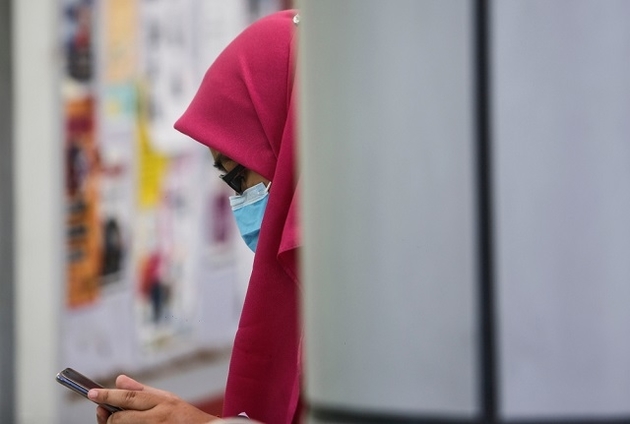Opinion
Reaching out to Undocumented Workers is Necessary to Contain COVID-19 Outbreak

Source:Shutterstock
To effectively curtail the epidemic, the Taiwan government should provide medical support, reach out to undocumented workers, and pardon and rectify their undocumented status. Such measures could incentivise undocumented workers to seek medical help when they fall ill rather than become ostracised. It takes a nation to contain an epidemic.
Views
Reaching out to Undocumented Workers is Necessary to Contain COVID-19 Outbreak
By Hong-zen Wang, Pei-chia Lan, Yen-fen Tseng, Chia-ling Wu, Chiung-chih ChenOpinion@CommonWealth
On 26th February 2020, Taiwan Centers for Disease Control (CDC) announced that there have been 32 confirmed cases of the novel coronavirus infection in Taiwan. Case #32 was unknowingly infected when she was employed as the caregiver for Case #27 during the latter’s hospitalisation. After the CDC disclosed her identity as an ‘illegal’ Indonesian migrant worker, public fears surged; consequently, several county governments announced that they would tighten the measures and crackdown on undocumented workers.
Currently, the number of undocumented migrant workers in Taiwan has risen to 50,000. They became ‘undocumented’ from the government’s registration after they absconded due to a range of causes, such as recruitment fees and debt, poor working conditions or overstaying their visa. In spite of being undocumented, in varying positions, they continue to provide critical labour and services for the society of Taiwan. This is particularly evident for those families who require imminent medical care or who are waiting for the approval of employing a replacement foreign caregiver. These families cannot help but resorting to employ undocumented workers as short-term caregivers.
Medical resources for containing COVID-19 are not easily available for migrant workers because of language barriers and the lack of information. This is particularly the case for undocumented workers owing to their undocumented status and the lack of National Health Insurance (NHI) coverage. The contrast between local medical staff and foreign caregivers is a case in point. Take Case #27 for example, the unprotected caregiver who provided personal care was the only one who fell ill, while none of the medical staff at his hospital was infected. Being exposed to an environment where there is a higher health risk, undocumented migrant workers and short-term caregivers have to be included in an extended protection net weaved by the society.
Stopping Alienation or ‘Manhunt’ Could Incentivise Them to Seek Help
Dr Shih-chung Chen, the Minister of Health and Wealth and CDC Chief Officer, critically reminded several times that ‘no one would like to be sick’. Migrant workers are human beings, too, and would not like to be sick, either. This is more so amongst undocumented migrant workers. Once they fall ill, the prices they pay would not only be losing jobs and suffering debt bondage but also be burdened by significant medical bills and repatriation.
In two days, after the identity of Case #32 was revealed, some local county governors publicly announced to further crackdown on undocumented migrant workers. This measure actually ran against the guiding principles set by Dr Chen for containing the outbreak. Whether a heavy-handed approach to catch undocumented migrant workers is fit for purpose is questionable. Had it been effective, there would not have been more than 50,000 undocumented workers still at large. More critically, executed with penalties without incentives, an all-out campaign to round up undocumented workers up and down the island would further convince them the need to conceal their sickness and become reluctant to seek medical help. This is not conducive for containing the spread of the disease.
Furthermore, the CDC disclosed the history of activities and contacts of Case #32 between 16th and 24th February. Arguably, a good intention of making her whereabouts public knowledge is to raise awareness amongst those who might have been in the places visited by her or come in close contact with her. Nevertheless, such a press release that has an effect no less than cyber manhunt could set off a vicious cycle. That is, undocumented workers would be discouraged from informing the health authorities of their contacts and whereabouts. Their hesitation for cooperation would not help the CDC map out their movements. A deficit of information like this would inflame stronger fears towards undocumented workers within the host society and exacerbate racism and stigmatization.
Supporting and Reaching Out to Undocumented Workers
To effectively curtail the epidemic, we would like to call on the government to provide medical support, re-reach out to undocumented workers, and pardon and rectify their undocumented status. Such measures could incentivise undocumented workers to seek medical help when they fall ill rather than become ostracised. To prevent a large-scale infection, we would like to put forward the following propositions:
Firstly, the approach undertaken by the government at all administrative levels should be ‘assisting and encouraging undocumented workers to turn themselves in’ rather than ‘searching and catching’.
Secondly, making it available for undocumented workers who are not covered by the NHI to access resources necessary for self-protection, particularly amongst caregivers who are exposed to a higher risk. If suspected of infection, they should be provided with free medical resources and assistance.
Thirdly, facilitating a grace period during which self-reporting undocumented workers may be exempt for expulsion and ineligibility for employment in Taiwan. They shall be permitted to seek legal employment in Taiwan (as in normal cases where their employment contract can be renewed every three years).
Lastly, reviewing the current regime of migrant worker employment and rectifying the current policy that employers are accountable for migrant workers’ absconding and will temporarily lose their recruitment quota. Employers who hire undocumented workers may be pardoned and exempt from punishment. These reforms may encourage employers and undocumented workers to take part in the overall efforts to prevent COVID-19 from further spreading.
Migrant Workers Are Part of the Taiwanese Community
Regardless of being on a legal or undocumented status, in varying positions, migrant workers are contributing to the running of the host society in villages, at factories, at hospitals, in the home or in major construction sites. They dedicate their hard work at a considerable risk. Protecting their health and providing medical care is to show our gratitude and pay our tribute to these workers who are far away from home.
Our propositions outlined above will benefit the government, employers and migrant workers. Not only would these measures fill the gap for containing the disease but also create a legal and reasonable working environment. The pressing crisis may offer a critical window of opportunity for us to change social institutions.
It is time for us to review, comprehensively and holistically, the current migrant worker recruitment and employment system and their marginalised working and living environments. The measure for disease prevention may turn out to be a source for solidarity. Migrant workers are part of the Taiwanese community. We are all in the same boat; together we set sail and shall safely reach the shore.
Editor’s note: The original Chinese-language op-ed was published by the Commonwealth Magazine on 29th February 2020 at https://opinion.cw.com.tw/blog/profile/52/article/9133. Translated by Isabelle Cheng.
Have you read?
♦ How Taiwan Fights COVID-19
♦ Where is Globalization Headed Amid COVID-19 Epidemic?
♦ Desperation in Wuhan
♦ Apple Supply Chain Disrupted by Novel Coronavirus
♦ Coronavirus to Take Bite out of GDP - Can Taiwanese Companies Cope?
♦ Coronavirus Outbreak is a Disaster of China's Nationalism: Academia Sinica Scholar
- Hong-zen Wang is a Professor at the Department of Sociology of the National Sun Yat-Sen University.
- Pei-chia Lan is a Professor at the Department of Sociology of the National Taiwan University.
- Chia-ling Wu is a Professor at the Department of Sociology of National Taiwan University.
- Yen-fen Tseng is a Professor at the Department of Sociology of the National Taiwan University.
- Chiung-chih Chen is a Post-Doctoral Research Fellow at the International Institute for Cultural Studies of the National Chiao Tung University.
- Isabelle Cheng is a Senior Lecturer (Associate Professor) at the School of Area Studies, History, Politics and Literature of the University of Portsmouth.
Opinion@CommonWealth website is a sub-channel of CommonWealth Magazine. Founded in January 2013 with its main focus on social, humanity and policy issues and opinions, Opinion@CommonWealth is dedicated to building a democratic, diverse platform where multi opinions can be presented.
Currently, there are approximately 100 columnists and writers co-contributing on Opinion@CommonWealth to contemplating and exploring Taiwan's future with the Taiwanese society.













